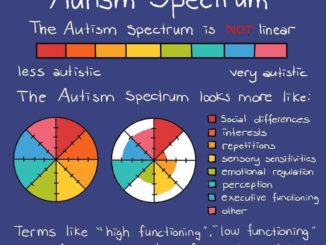Remember that I had a post a few days ago about classifications of autism — i.e., “mild” vs “severe”, or “high functioning” vs “low functioning”.
Well, for some people, Asperger’s goes into those types of categories. Some quick facts about Asperger’s:
-It’s usually utilized as a quick shorthand for “mild autism”.
-It’s sometimes even utilized as a coded way of saying “acceptable autism” — from a societal point of view.
-Some people really identify with their own diagnosis of Asperger’s and use it as their self-descriptor, or terminology derived from it such as “Aspie”.
-It was a diagnosis name in the DSM-4 (recall that the current diagnostic manual for psychiatric conditions is the DSM-5).
-By its definition, a diagnosis of Asperger’s under the DSM-4 criteria meant that the person being diagnosed could not have language delays or significant intellectual disability. However, it did include some facets of autism diagnostic markers such as special interests, stimming, difficulties with social interactions, neurodivergent nonverbal communication, etc.
-It is named after Austrian pediatrician Hans Asperger, who studied autism extensively and wrote about it, and who also referred children with disabilities to a Nazi clinic known for its medical experimentation and euthanasia on children.
You can see why there is a bit of a tangled history as to whether or not this person’s name ought to be something that Autistic people are attached to.
For many people who identify themselves as having Asperger’s or being “Aspies”, this is the name that unlocked a diagnosis that meant something for them, that explained to them who they are, that made the world make sense. They might have always felt left out or like the world wasn’t made for them, and receiving a diagnosis shifted that.
For kids being diagnosed autistic nowadays, we do not use the language “Asperger’s” anymore as there has been a shift away from wanting to honor the man who it is named for.



